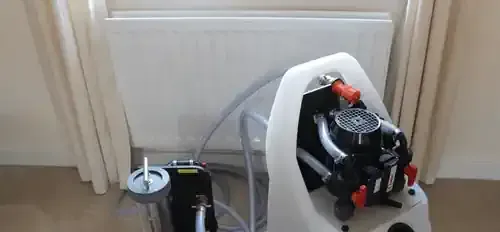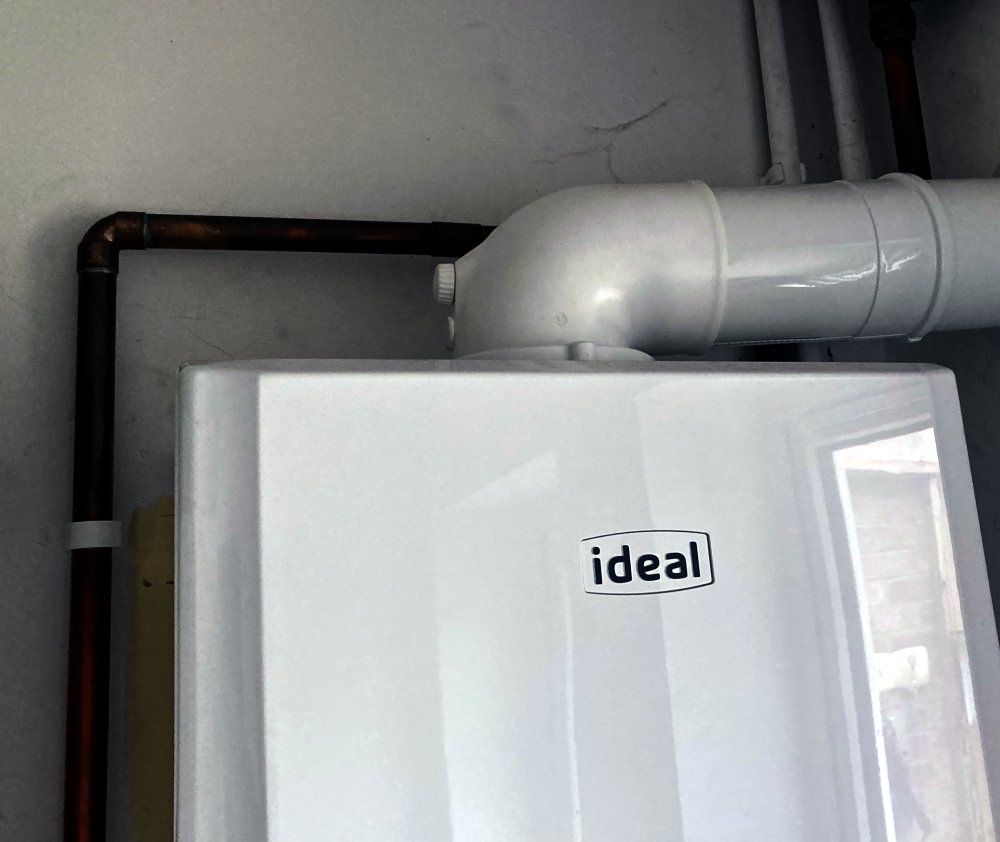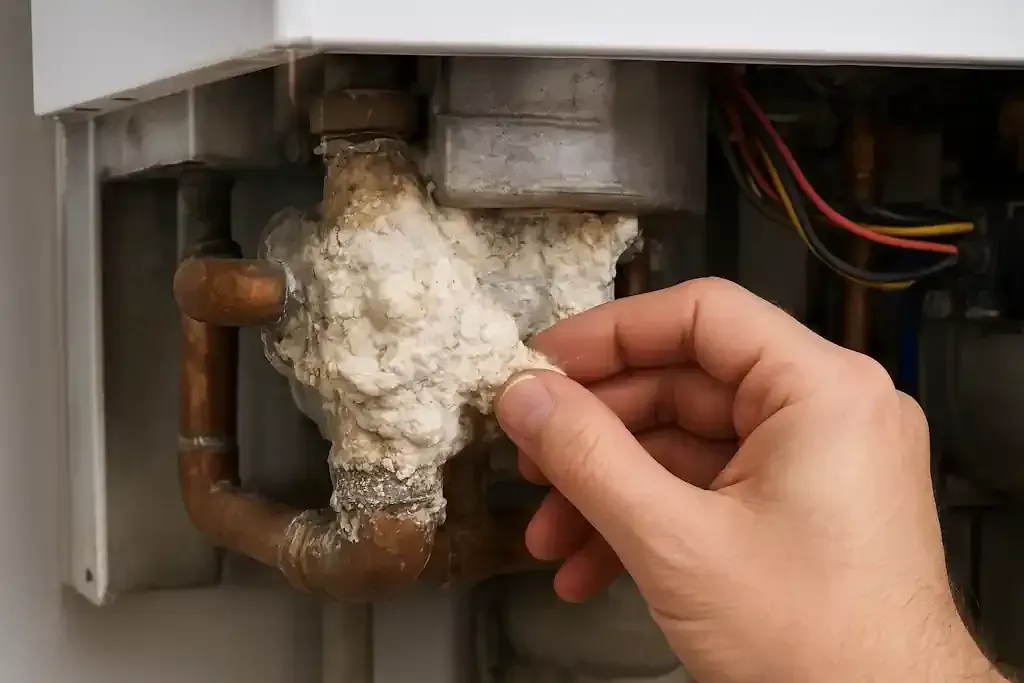What Does Power Flushing Cost?
What is power flushing?
Power flushing is a process of flushing the central heating system usually using water, or chemicals to remove scale and sludge build-up within the system
This process can remove any debris that has accumulated over time and improve the efficiency of your heating system.
You can read more about the actual process in our previous blog article what is a central heating power flush
Why power flush central heating?
Central heating is an important part of our home. It provides us with warmth and comfort, but it also needs to be maintained to ensure that it is working as efficiently as possible.
The boiler heats the water in the tank, which then flows through copper pipes to radiators in each room. When the water travels through these pipes, it picks up sediments such as rust and sand that are present in the water supply. These sediments can cause problems for your central heating system, so it’s important to get rid of them by flushing them out periodically with a power flush.
This is a necessary step for many homeowners because it’s important to keep the pipes clear and free of debris to maintain efficiency.
What happens during a heating system power flush?
From a simple system flush with clean water to a powerful power flush on more contaminated systems, using specialised equipment and chemicals.
Either will help to remove blockages and prevent your boiler and heating system from being contaminated and inhibited by sludge and debris, but each power flush will depend on the need for flushing, the severity of the issue, as well as the size of the heating system, type of property and number of radiators in the property.
Will a power flush clear a blockage?
Depending on the type of blockage in your heating system, a power flush will usually clear this as well as remove any smaller debris, therefore, preventing further build-up and future blockages from occurring.
If your system has not been installed correctly or has been left for blockages to build up over a long period, then a power flush may not be the solution, as you may need the boiler, radiators or pipes removed or replaced to remove a larger or more stubborn blockage.
How to power flush a central heating system.
A power flush is a process of removing sediment and other impurities from the heating system. It is usually done to improve the efficiency of the central heating system, but it will also increase the lifespan of the boiler and radiators.
The power flushing process starts with a thorough inspection of the system, followed by either water or chemical cleaning. The boiler will then be drained and refilled with fresh water. A power flush can be done at any time during the year, but it is best to do it when there are no heating requirements for at least 24 hours after completion.
You can read more about the actual process done by Assett Plumbing in our previous article on what is a central heating power flush.
When to power flush?
Power flushing is required when the central heating system is heavily contaminated or blocked. This can be due to several reasons such as the system not being fully flushed before installation, a buildup of dirt, debris or sludge, and even due to bacterial growth.
Most boiler manufacturers require a suitable power flush is carried out before the installation of a new boiler or heating system to retain the warranty of the boiler.
Some of the times when power flushing is recommended are:
- Installation of a new heating system
- Before a boiler replacement
- During a boiler repair
- Radiator replacement
- Heating systems pipework replacement or repairs
How often do you need a Powerflush?
Before the installation of a new boiler or replacement of an old one, it is essential to power flush the heating system, as this will remove any residue or debris within the pipes, and will prevent these from finding their way into the new boiler potentially causing a boiler breakdown in the future, as well as ensuring that the warranty on a new boiler remains valid.
If a radiator or any pipework has been replaced, a power flush is also recommended, as it’s an ideal opportunity whilst the heating system is out of operation to clean the system throughout and prevent future work needing to be done which would again mean draining and turning the heating system off.
Aside from any work or repairs being done to the heating system we also recommend that a power flush is done every 5-6 years, regardless of whether the system has been problematic to date. This is preventative maintenance which will extend the life of your heating system and prevent costly emergency plumbing breakdowns in the future.
How do I know if my central heating needs a power flush?
Several signs could help determine whether your system needs a Powerflush including:
- Radiators are colder than expected, or have cold spots,
- Radiators are cold at the bottom but hot on top
- Radiator leaks or stains under valves
- Dirty water when radiators are bled
- Noisy radiators or a noisy boiler
- Frequent boiler breakdowns
- The boiler constantly needs to be restarted
- Your central heating takes a long time to heat up
- Some radiators struggle to heat more than others do
Power flush cost.
On average, power flushing in a residential property costs between £400 and £900 depending on the size of the house and the number of radiators.
The cost of power flushes can also vary depending on what type of system you have and how much work needs to be done.
For example, if your system is old and needs a lot of work, you can expect to pay more than if your system isn't as old or doesn't need as much maintenance.
For a no-obligation quote for a power flush call Assett Plumbing today on 01604 372395.
Is a power flush worth the money?
Some people believe that power flushes are not worth the time and money. They argue that it is a waste of resources because the pipes are already clean.
But is it worth the money? In a word YES!
Power flushes are a way of removing the sediment and dirt in your central heating system. This can help to improve the efficiency of your boiler and radiators.
Depending on how often you use your central heating system, it could be the difference between a cold and warm property, it could save you a fortune in future heating bills, as well as prevent boiler or heating system plumbing emergency callouts or boiler repairs or replacements made necessary by a build-up or blockages within the heating system. If you use your heating regularly and have had the boiler for at least 5 years then a power flush could be beneficial for you.
You can read more about the benefits of power flushing your heating system within our blog:
https://www.assettplumbing.co.uk/benefits-of-power-flushing-your-heating-system
Why is Powerflush so expensive?
A power flush can seem like an expensive process, but it is also a necessary one. It helps to remove the scale that builds up in the central heating system over time. This scale can cause blockages and clogs that can lead to a breakdown of your boiler.
The real reason for the cost comes down to the time it takes to do a good job, as well as the chemicals and equipment that may be necessary depending on the scale of the work.
Factors that can determine the price of a power flush are:
- Type of property
- Age of property
- Age and heating system
- Type of boiler
- Size of property
- Number of radiators
All of the above factors will determine how long the power flush will take, the type of power flush required, as well as equipment and chemicals needed for the job, all of which will affect the cost.
Factor in the cost of a replacement boiler or heating system if either should fail as a result of sludge or dirt build-up, and the cost of a power flush seems a lot more reasonable, much like having a regular service or MOT on your car can keep it running for many years fault-free.
When should a power flush not be done?
We recommend that if you have a boiler that is more than 15 years old, it would be best to get it replaced, as these boilers are not able to remove scale as effectively as newer models.
That age of boiler is less likely to have its life significantly extended by using a power flush, so it would be wiser to save your money to put towards a new boiler or central heating installation.
As part of the new boiler installation, power flushing would be done as standard anyway, therefore the rest of your heating system would be fully checked and cleaned to get the best efficiency and life from the new boiler that has been installed.
Should a power flush be done when installing a new boiler?
We recommend that as part of a boiler installation that your central heating system should be power flushed.
Over years of use, dirt, scale, sludge, and depending on the age and condition of the boiler being replaced, potentially other contaminants such as rust, which will not only potentially block pipes, and reduce the effectiveness of the heating system but could actually cause other elements of the heating system to fail in future, despite the boiler having been replaced.
Your heating engineer will advise on the beat course of action, and of course the age of the radiators, pipes and the rest of the heating system will play a large part in whether a power flush is necessary.
Of course, it could be a cheaper option to get the power flushing done at the same time as the boiler installation anyway, as it will often work out cheaper than doing both separately.

Can you power flush just one radiator?
Yes, if only one radiator seems to be problematic, then the single radiator can be isolated, removed and flushed.
Whilst your plumber is on-site, it’s worth having the rest of the system checked, as the one radiator at fault may be an indication of a larger problem or build-up of sludge or debris elsewhere in the system and your plumber can recommend if the single radiator flush will be sufficient at that time to resolve the issue, or if further work is recommended.
Ask Assett Plumbing about power flushingannual during your next boiler service to decide if it could be a good time to get this done.
Can you power flush radiators yourself?
Yes, if you prefer the DIY approach you can flush a radiator yourself, particularly if there isn’t a large amount of sludge in your radiator. If you can safely remove and lift the radiator, or get someone to help you lift it, then you can flush a radiator yourself with basic equipment such as a garden hose and water.
However, to power flush radiators properly, you would need a power flushing machine.
A power flushing machine is an appliance that uses water pressure and optionally special chemicals to clean the inside of the radiator and remove any sediment or debris.
We would highly recommend leaving such work to a professional, and any work undertaken by you would be done so at your own risk.
Looking for a local company to power flush your central heating system?
Assett Plumbing are a local Northamptonshire based plumbing and heating firm servicing boilers, installing central heating systems and performing power flushing on central heating systems near you every day of the week.
Book a Central Heating Power Flush Today
Contact Assett Plumbing today on
01604 372395 to get your boiler, heating system and radiators power flushed.




